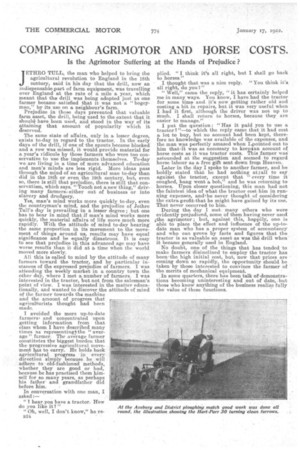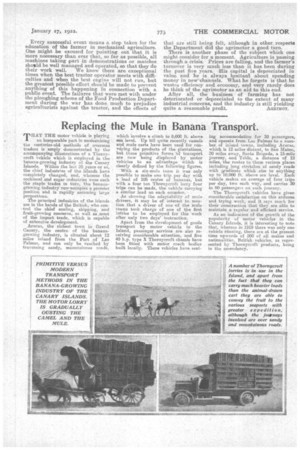COMPARING AGRIMOTOR AND HORSE COSTS.
Page 24

Page 25

If you've noticed an error in this article please click here to report it so we can fix it.
Is the Agrimotor Suffering at the Hands of Prejudice ?
JETHRO TULL, the man who helped to bring the agricultural revolution to England in the 18th century, said in his day that the drill, now an indispensable part of farm equipment, was travelling over England at the rate of a mile a year, which meant that the drill was being adopted just as one farmer becamesatisfied that it was not a "bogeyman," by its use on a neighbour's farm. Prejudice in those days prevented that valuable farm asset, the drill, being used to the extent that it should, have been used, and stood in the way of its attaining that amount of popularity which it deserved.
The same state of affairs, only in a lesser degree, 'exists to-day in regard to the tractor. In the early days of the drill, if one of the spouts became blocked and a row was missed, it would provide material for a year's ridicule by those farmers who were too conservative to use the implements. themselves. To-day we are living in a time of more advanced education and men's minds are less rigid. More ideas pass through the mind of an agricultural man to-day than did in the 18th or even the 19th century, but, even so, there is still that prejudice, there is still that conservatism, which says. "Touch not a new thing," driving many farmers, either out of business or into slavery and drudgery.
Yes, man's mind works more quickly to-day, even the countryman's mind, and the prejudice of Jethro Tull's day is prevailing in a lesser degree; but one has to bear in mind that if man's mind works more quickly, the material affairs of life move much more rapidly. With the attitude of mind to-day bearing' the same proportion in its movement to the movement of things around us, results may have equal significance and be equally disastrous. It is easy to see that prejudice in this advanced age may have worse results than it did at a time when the world moved more slowly.
All this is called to mind by the attitude of many farmers toward the tractor, and by particular instances of the expressed prejudice of farmers. I was attending the weekly market in a country town the other day, where I met a number of farmers. I was interested in the tractor, but not from the salesman's point of view. I was interested in the matter educationally, and wanted to discover the attitude of mind of the farmer towards the machine and the amount of progress that agriculturists thought had been made.
I avoided the more up-to-date farmers, and concentrated upon getting information from that class whom I have described many times as representingtthe " average" farmer. The average farmer constitutes the biggest burden that the progressive agricultural movement has to carry. He holds back agricultural progress in every direction simply because he will adhere to • old-fashioned methods, whether they are good or bad, because he has practised them himself for so many years, as perhaps his father and grandfather did before him.
In conversation with one man, I asked:
' I hear you have a tractor. How do you like it'?"
" Oh, well, I don't know," he reB24 plied. "I think it's all right, but I shall go back to horses," I thought that was a nice reply. "You think it's all right, do you?" " came the reply, "it has certainly helped me in many ways. You know, I have had the tractor for some time and. it's now getting rather old and costing a bit in repairs, but it was very useful when I had it first, although the driver was not up to much. I shall return to horses, because they are easier to manage."
I put the question : "Has it paid you to use a tractor ? "—to which the reply came that it had cost a lot to buy, but no account had been kept, therefore no knowledge was available of the expenses, and the man was perfectly amazed when Ispointed.out to him thateit was as neceSsary to keel:4am account of horse costs as it was tractor costs. This farmer wai astounded at the suggestion and seemed to regard horse labour as a free gift sent down from Heaven.
Later in the day I spoke to another farmer, and he boldly stated that he had nothing at,m11 to say against the tractor, except that every time it coughed, bang went a bob," and he was returning to horses. Upon closer questioning, this man had not the faintest idea of what the tractor cost him in running expenses, andahe never thought of considering the extra profitsthat he might have gained by its use. That never occurred to him.
During the day I metmany others who were evidently prejudiced, some of them having never used the agrimotor ; bat, against this, happily, one is able to place the effect and influence of the up-todate man who has a proper system of accountancy and who can prove by facts and figures that the tractor is as valuable an asset as was the drill when it became generally used in England.
No doubt, one of the things that has tended to make farmers disinclined to employ the tractor has been the high initial cost, but, now that prices are coming down so rapidly, the opportunity should be taken by those interested to convince the farmer of the merits of mechanical equipment. In some quarters, there has been talk of demonstrations becoming uninteresting and out of date, but those who know anything of the business realize fully the value of these functions. Every successful event means a step taken for the education of the farmer in mechanical agriculture. One might be excused for Pointing out that it is more necessary than ever that, so far as possible, all machines taking part in demonstrations or matches shotdd be well managed and operated, so that they do their work well. We know there are exceptional times when the best tractor operator meets with difficulties and when the best engine will not run, but the greatest possible effort should be made to prevent anything of this happening in connection with a public event. The failures that were met with under the ploughing scheme of the Food Production Department during the war has done much to prejudice agriculturists against the tractor, and the effects of that are still being felt, although in other respects the Department did the agrimotor a good turn.
There is another phase of the subject which one. might consider for a moment. Agriculture is passing through a crisis. Prices are falling, and the farmer's turnover is very much less than it has been during the past five years. His capital is depreciated in value and he is always hesitant about spending money in new channels. What he forgets is that he wastes efficiency and economy, and very rarely does he think of the agrimotor as an aid to this end.
After all, the business of farming has not deteriorated or depreciated to the extent of many industrial concerns, and the industry is still yielding quite a reasonable profit. AGRI3i0T.




























